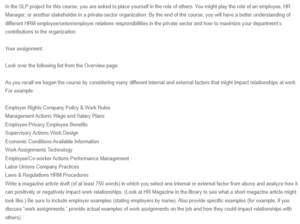Management Actions – Wage and Salary Plans
Employee relationships play a significant role in an organization’s performance. The relationships include the relationships among employees and between employees and managers or supervisors. Employee relationships also include horizontal and vertical employee relations. Vertical employee relations include the relationship between an employee and their supervisors. On the other hand, horizontal employee relations include the relationship between employees. Employees may establish relationships with their team members, colleagues, line managers, trainees or apprentices, customers, and mentors. These relationships must be managed effectively to create a positive relationship, address difficulties with an approach that allows all parties to win, and promote the exchange of information among employees (Roffey, 2016). Organizations also encourage positive employee relationships to create a sense of community and encourage employee teamwork. Organizations focus on developing and promoting positive employee relationships by creating a conducive environment for employees to interact and meet their needs.
How Wage and Salary Impact Employee Relationships
Wage and salary impact employee relationships in various ways. According to Wixson (2023), compensation systems create a foundation for relationships within an organization because if people are not well compensated, they do not effectively contribute to the management and control of resources aimed at helping them achieve the organization’s goals. This could create conflicts that negatively impact the relationship among employees and between employees and management. Compensation may also create conflict between employees and management. For instance, if employees feel that the wage or salary is unfair, they may develop a negative attitude toward their employer and other employees receiving higher pay, leading to reduced teamwork and poor organizational performance. Wage and salary could also increase employee absenteeism, leading to poor relationships among employees and between employees and their managers. For instance, if an employee’s absenteeism results in an increase in other employees’ workload, the employees whose workload has been increased may develop a negative relationship with the absent employees, leading to tension in the workplace and reduced collaboration among employees. The absent employee could also have a negative relationship with the manager because of the constant warnings issued by the manager about the absenteeism.
The negative impact of wage and salary on employee relationships can also be observed when employees develop an entitlement because of the wage and salary offered by an organization. Entitlement arises when a person believes they have the right to receive something. Entitlement among employees may create a negative relationship between managers and employees, especially if managers cannot meet the employees’ expectations. For instance, if employees feel that they are entitled to a higher wage or a pay increase because of their experience or education level and they are not offered the wage or salary they want, they may develop a negative attitude towards the manager and fellow employees receiving the desired wage or salary which increases the possibility of a conflict arising among the employees and between the employees and managers.
Payment and wage structures may also positively or negatively impact employment relationships. For instance, transparent payment structures can create a work environment that enables employees to express dissatisfaction without fear of retaliation from the management team and create an expectation that leaders will address their concerns. For example, an organization can make a positive relationship between management and employees by adjusting salary and wages based on employees’ suggestions. For instance, Google has managed to maintain a positive relationship between the employees and management by listening to employees’ concerns about compensation and addressing the concerns without compromising the organization’s needs. Jljenniferliu (2022) argues that Google CEO Sundar Pichai addressed the concerns raised by employees about compensation in March 2022 by increasing employee salaries in May and adjusting the performance review system to improve promotions and pay structures. This move resulted in a positive relationship between the employees and management and increased employee performance, which then increased the company’s overall performance.
The negative link between wage and salary and employee relationship is evident when an organization cannot meet employees’ expectations regarding wage and salary. For instance, a negative relationship between employees and managers may arise if employees are unfairly compensated and ignored when they raise concerns about the wages and salary they receive. Such a situation emerged at Darden Restaurant after employees accused the company of violating federal labor laws. The organization experienced tension between its management team and employees because the employees claimed they were underpaid (Thoelcke et al., 2012). The tension between managers and employees at the organization increased after employees demanded a lot of money to cover back wages and other compensation because the wages and compensation would negatively impact the organization’s revenue. Eventually, the management team had to accept the employees’ demands to restore a good relationship between management and the employees and increase employee productivity.
Conclusion
Employee relationships are important in maintaining organizational operations and promoting organizational performance through teamwork and collaboration in completing tasks. Some of the factors that could impact employee relationships positively or negatively include wage and salary. Wage and salary can positively impact employee relationships by promoting job satisfaction (Watkins & Fusch, 2022). Positive employee relationships can also be developed if an organization addresses employees’ concerns about wages and salary. However, entitlement over wages and salary could negatively impact employee relationships. Wage and salary could also negatively impact employee relationships if employees feel that they are unfairly compensated. Employees may also develop a negative relationship with managers if their needs concerning wage and salary structures are not addressed. Therefore, it is important for organizations to regularly review their compensation arrangements to ensure that employees’ needs are met.
References
Jljenniferliu. (2022, October 14). Workers at these 15 companies are happiest with their pay, says a new report here’s why. CNBC. https://www.cnbc.com/2022/10/14/workers-at-these-15-companies-are-happiest-with-their-pay-comparably-ranking.html
Roffey, S. (2016). Positive Relationships at Work. In The Wiley Blackwell Handbook of the Psychology of Positivity and Strengths-based Approaches at Work (pp. 171–190).Wiley Blackwell.
Thoelcke, T., Sauter, M., Hess, A., & Weigley, S. (2012, December 1). The 12 biggest companies paying workers the least. USA Today. https://www.usatoday.com/story/money/business/2012/12/01/companies-paying-the-least/1735531/
Watkins, R., & Fusch, P. (2022). Employee monetary compensation and employee job satisfaction. Open Journal of Social Sciences, 10(09), 321–339. https://doi.org/10.4236/jss.2022.109021
Wixson, J. (2023). The impact of compensation framing on work relationships. University of New Hampshire Scholars’ Repository. https://scholars.unh.edu/honors/715/
ORDER A PLAGIARISM-FREE PAPER HERE
We’ll write everything from scratch
Question
In the SLP project for this course, you are asked to place yourself in the role of others. You might play the role of an employee, HR Manager, or another stakeholder in a private-sector organization. By the end of the course, you will have a better understanding of different HRM employee/union/employer relations responsibilities in the private sector and how to maximize your department’s contributions to the organization.

Management Actions – Wage and Salary Plans
Your assignment:
Look over the following list from the Overview page:
As you recall we began the course by considering many different internal and external factors that might impact relationships at work. For example:
Employer Rights Company Policy & Work Rules
Management Actions Wage and Salary Plans
Employee Privacy Employee Benefits
Supervisory Actions Work Design
Economic Conditions Available Information
Work Assignments Technology
Employee/Co-worker Actions Performance Management
Labor Unions Company Practices
Laws & Regulations HRM Procedures
Write a magazine article draft (of at least 750 words) in which you select one internal or external factor from above and analyze how it can positively or negatively impact work relationships. (Look at HR Magazine in the library to see what a short magazine article might look like.) Be sure to include employer examples (stating employers by name). Also provide specific examples (for example, if you discuss “work assignments,” provide actual examples of work assignments on the job and how they could impact relationships with others).
Include 2 additional library sources (or more) to help strengthen your submission.
Upload your paper by the module due date.
SLP Assignment Expectations
Demonstrate critical thinking and analysis of the relevant issues and HRM actions, drawing on your background reading and research.
Information Literacy: Evaluate resources and select only library/web-based resources that provide reliable, substantiated information.
Give authors credit for their work. Cite sources of borrowed information in the body of your text as footnotes or numbered end notes, or use APA style of referencing.
Prepare a paper that is professionally presented (including a cover page, a list of references, headings/subheadings, and a strong introduction and conclusion). Proofread carefully for grammar, spelling, and word usage errors.
Citation and reference style instructions are available at Trident University’s Introduction to APA Style, 7th edition.



